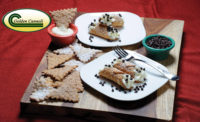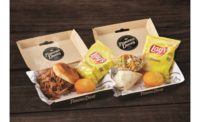
Dave Allen
Snack Food & Wholesale Bakery was recently able to talk to David Allen, vice president of sustainability, PepsiCo Foods North America, on Frito-Lay's new sustainable packaging alternatives.
Doug Peckenpaugh: Why is Frito-Lay investigating more-sustainable packaging alternatives for its brands?
David Allen: Frito-Lay, PepsiCo’s Food division in North America, is on a mission to build a more sustainable food system. This is why the company recently announced PepsiCo positive (pep+), its sustainability agenda that speaks of how the company will create growth and value by operating within planetary boundaries and inspiring positive change for the planet and people.
pep+ will guide how PepsiCo will transform its business operations: from sourcing ingredients and making and selling its products in a more sustainable way; to leveraging its more than one billion connections with consumers each day to take sustainability mainstream and engage people to make choices that are better for themselves and the planet.
We want to be part of the solution and we’re making critical progress in our packaging sustainability journey through the introduction of at-home and industrially compostable snack packaging.
Frito-Lay has been investing in breakthrough food packaging technology and aims to design 100 percent of its packaging to be recyclable, compostable, biodegradable or reusable for its entire brand portfolio by 2025.To complement the Off the Eaten Path brand packaging pilot, Frito-Lay has partnered with TerraCycle for the collection of these bags, which will allow consumers to ship back empty bags free of charge to be commercially composted.
For every specially marked compostable Off the Eaten Path bag returned to TerraCycle by May 30, 2022, Off the Eaten Path will donate $1 to Ocean Conservancy (up to $192,000 will be donated).
DP: Why is it important to create packaging materials that are recyclable or biodegradable?
DA: Frito-Lay recognizes the important role we play in driving towards a circular economy and reducing packaging waste. That’s why we are investing in plans to scale circular food packaging that is recyclable, compostable, biodegradable, or reusable and sharing that technology to build a more sustainable food system for us all.
We see these new, industrially compostable Off The Eaten Path bags as a way for consumers to forge a new path forward in creating a world where packaging never becomes waste.
DP: What technology is involved with this packaging?
DA: The Off the Eaten Path packaging is made using PLA and is industrially compostable. We hope to further develop and use new technologies so that we can offer consumers a bag that will be compostable or biodegradable in more environments.
Producing the materials used for these bags creates 60 percent lower greenhouse gas emissions than traditional packaging and eliminates waste.
DP: What is Frito-Lay’s timeline for implementing these new packaging technologies?
DA: The packaging is available on specially marked Off The Eaten Path Chickpea Veggie Crisps or Off The Eaten Path Veggie Crisps. These bags are currently available at Whole Foods Market and select retailers since August 2021. Currently, the pilot is ongoing and learnings from this pilot will enable us to consider expanding the pilot beyond a year.
DP: How does this packaging initiative fit into overall sustainability plans for PepsiCo?
DA: Our investments in breakthrough food packaging technology is part of PepsiCo’s overall pep+ transformation. pep+ is an end-to-end transformation that puts sustainability at the center of how the company and its entire food and beverage portfolio will create growth and value by operating within planetary boundaries and inspiring positive change for the planet and people. pep+ drives action and progress across three key pillars, bringing together a number of industry-leading 2030 goals under a comprehensive framework, with Frito-Lay already making significant advancements:
- Positive Agriculture: We’re working to spread regenerative practices to restore the earth across land equal to the company’s entire agricultural footprint (approximately 7 million acres across the globe), sustainably source crops and ingredients, and improve the livelihoods of more than 250,000 people in its agricultural supply chain.
- Currently, 100 percent of the potatoes and corn used to make Frito-Lay products in North America are sustainably sourced.
- Positive Value Chain: We will help build a circular and inclusive value chain through actions to achieve:
- Net-Zero emissions by 2040;
- Frito-Lay has implemented 100 percent renewable electricity for all of its U.S. plants, offices and distribution centers. 100 percent of Frito-Lay manufacturing sites use LED lighting with expected savings equivalent to 21,200 metric tons of CO2. Frito-Lay is decarbonizing its fleet through the use of Renewable Compressed Natural Gas and other new zero and near zero emissions vehicles. This includes completely replacing all existing diesel-powered freight equipment with Zero-Emission and Near-Zero Emission technologies at one of the company’s largest facilities in Modesto, California.
- Become Net Water Positive by 2030;
- For example, Frito-Lay's Casa Grande, Ariz., manufacturing facility recycles up to 75 percent of process water, enabling the site to reduce its water use by 100M gallons/year. Frito-Lay's Kern plant is optimizing water usage in corn process lines, saving 30M gallons of water annually. And, Frito-Lay’s investment in the California Wildfire Restoration project will result in 260,000+ trees planted, 280+ acres reforested and 138M gallons per year of water replenishment by 2022.
- Net-Zero emissions by 2040;
- Positive Choices: We continue to evolve our food products so that they are better for the planet and people, including by:
- Purposely incorporating more diverse ingredients in both new and existing products that are better for the planet and deliver nutritional benefits, prioritizing chickpeas, plant-based proteins and whole grains, such as Off The Eaten Path, which has black beans, peas, purple sweet potatoes, carrots and chickpeas. Specifically Veggie puff and the Veggie crisp, which are made with real veggie, as well as a good source of fiber. Our Bare Snack portfolio is another great example that is made with real fruits and is baked, never fried.
- Expanding the consumer availability of our nuts & seeds where PepsiCo is already the global branded leader; Some examples are: Nut Harvest Cocoa Dusted Almonds, Nut Harvest Fruit & Nut Mix, Nut Harvest Cashews Lightly Salted.
- Accelerating our reduction of added sugars, saturated fat and sodium through the use of science-based targets across our product portfolio and offering more products with healthier oils; PepsiCo Foods North America (PFNA) is delivering PepsiCo's 2025 goal to ensure 90 percent of products don't exceed 1.1 g of sat. fat per 100 calories. PFNA is progressing against our sodium goals, with renovations continuing to reach our 2025 target of 75 percent of products with 1.3 mg or less sodium per calorie: We are working continuously to reduce sodium and saturated fat in our existing portfolio while introducing more options like Quaker Life cereal and Off The Eaten Path. Our Instant Quaker Oatmeal Protein and Quaker Large Rice Cakes (except White Cheddar) comply with our Sodium targets too.
- Continuing to scale new business models that require little or no single-use packaging. We are working toward PepsiCo’s goal of 100 percent of packaging to be recyclable, compostable, biodegradable or reusable by 2025. Off The Eaten Path’s new industrially compostable bag is a step along the journey.






